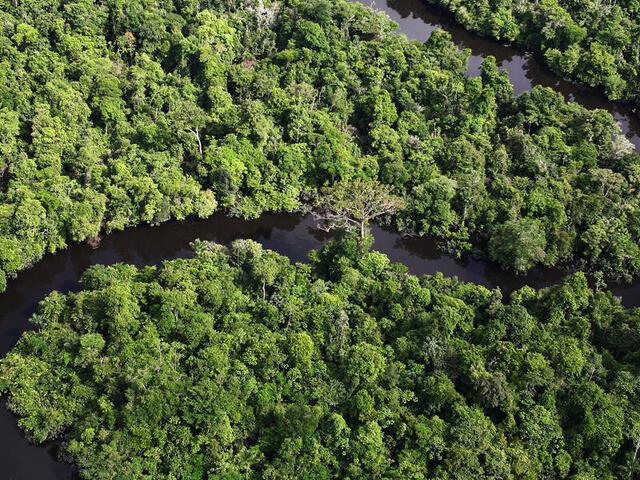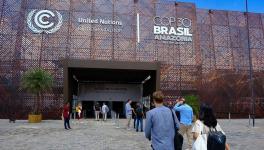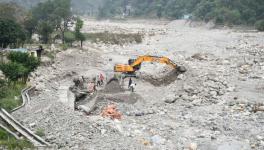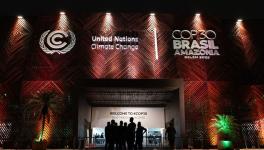Restitution, not Restoration, is the Way Forward

Image for representational purpose. Credit: World Wildlife Fund
April 22, 2023, marked three important dates: Earth Day, Eid ul Fitr, and Lenin’s birth anniversary. All these three dates are important in the ongoing evolutionary process of our planet Earth.
The United Nations started observing Earth Day in 1970 and this is the 53rd edition of the event.
‘Invest in Our Planet’ is the theme for 2023, focusing on engaging governments, institutions, businesses, and more than one billion people to participate annually in the ‘earth day’ events. The slogan is ‘everyone accounted for, everyone accountable’.
Kathleen Rogers, president of earthday.org called for a “green revolution” and for the health of future generations in the world. The green economy is the only path suggested for a prosperous and equitable future for humankind.
The ways suggested to achieve the desired form of the green economy are as follows:
· Green innovations and practices by businesses, inventors, investors, and financial markets. It is considered that akin to the economic revolutions, “the private sector has the power to drive the most significant change, with both the necessary scale and speed”.
· Governments must incentivise their citizens, businesses, and institutions to create and innovate, advancing the public’s interests and creating the framework for an equitable and sustainable global economic system. Ambitious action on green energy, etc.
· Individual citizens should push for sustainable solutions across the board as voters and consumers.
Platitudes and Flawed Understanding
The language and vocabulary of the theme and the desired results have an inherent contradiction and hence such processes and interventions fetch neither the desired results nor are able to bring in a major disruption.
“Everyone accounted for, and everyone accountable”, is something similar to the polluter asking the consumer to clear the pollution with an alibi of everyone being a part of the ecosystem responsible for the immense damage that has been done to planet Earth. Whereas, we know the role of the least developed countries and even the developing countries in climate change is minimal, though they face greater challenges and are more vulnerable than their ‘developed counterparts’ in the world. How can everyone be accounted for at the same level?
The IPCC reports have been screamingly pointing out at the imminent necessity of intervention. But this must be done with a climate justice perspective.
First, the reports point out the catastrophic levels of carbon emissions in the post-industrial period. These emissions have led to a rise in temperature. Since many COPs (Conference of Parties), particularly COP15 in Paris, the goal has been not to allow a rise of more than 1.5 degrees Celsius to the pre-industrial levels.
Another interesting fact is that half of the world's human-made atmospheric carbon dioxide was emitted in the last three to four decades. And in this period, just 20 big companies that contributed to almost 33% of world-historic emissions (energy and cement) are still at work and even grabbing subsidies for fossil fuels, etc.
So how can this be common accountability?
Between 1758-2020, CO2 emissions swelled from 0.01 billion metric tonnes to 34.07 billion metric tonnes.
Second, the imminent threat or the processes in which this threat is affecting the planet Earth is from three major various factors:
a. Biodiversity Loss: The loss of biodiversity is accelerating at a rate not found in any record (according to scientists) since the Cretaceous extinction, some 66 million years ago. Why is this a matter of concern? Simply because there is complete integration between biodiversity and us humans. As they say, if honeybees are gone, we will soon be extinct, though some pen-pusher scientists of the present order may say: "Don't worry, we can produce robotic honeybees". Utterly ridiculous!
b. Land Use Patterns: There is a strong interconnection between the change in land use patterns and biodiversity loss. Changes in land use patterns for industrial and real estate development are also causing water scarcity. The reductionist climate change theories view the problem with a very narrow lens. And in that exercise, they lose the essence of climate change, i.e., the predatory capital world that works on the essence of maximisation of profit, thus denuding the environment and nature. For example, the changes being brought out in the Andaman and Nicobar Islands, where land-use change is proposed for real estate development, or in the new laws framed in Lakshadweep, all point to a massive land-use change in the offing.
c. Excess Levels of Nitrogen: Vast excesses of nitrogen through fertilisers run off etc., have been polluting water bodies and soil, thus risking anoxic extinctions. Once large expanses of earth's oceans get depleted with dissolved oxygen creating toxic waters, this may lead to anoxic extinctions of many species. The scientists are warning of such an event.
Hence all of this is interconnected with systemic failures.
Alternative Models
Since climate change and its impact on planet Earth is not just an environmental catastrophe, which it definitely is, it is also a systemic crisis and without addressing it there can be no future solutions.
There has to be a massive push away from the current model of treating nature as another arena of commoditisation and capital appropriation. Then the suggested models with technological solutions do not address the core.
Take for example the push for electric vehicles without switching from fossil fuel means nothing more than an urban elite phenomenon. In a country like India where 80% of the energy is thermal generation electric vehicles consuming the same energy do not make much impact.
The alternative models must focus on ‘planning with nature” which Ian McHarg wrote in 1960. Planning is the most important tool for ensuring both mitigation and adaptability strategies.
The important areas where an alternative paradigm of planning is required are:
· City planning must be done with a climate lens and the people should be part of the planning process. Instead of parastatals like the development authorities planning cities guided and designed by consultants pushing for capital-intensive technologies, the people should be made an inalienable part of the process. The building typologies, take for example, should not be guided by either glass capital or large industries. The new typologies consume more energy for both cooling and heating and are not climate-friendly.
· Waste management. This is another area that needs prioritisation. Waste management cannot just be left out to the ‘capacity building exercise’ of the city or local governments. The kind of waste being generated is beyond the scope of management of the city government. During a waste audit in Leh, we found out that of the 10 biggest polluters eight are multi-national corporations and 70% of the waste is neither recyclable nor biodegradable. The provisions of EPR (Extended Producers Responsibility) must be revisited for making them stringent and executionary. Behavioural change does not just limit to the citizens as a subjective feature, it must include the manufacturing sector as well.
· Mobility is another major area that needs prioritization. Instead of constructing large flyovers, public transport is quintessential for a sustainable system. The mobility of the people and not the mobility of the cars is the key to driving forward.
Coming back to the three dates it is pertinent that we revisit Lenin’s birth anniversary, who developed Marxism further. In fact, it was Marx who brought out the interesting equation of:
struggle against injustice=struggle for humanism=struggle for naturalism
Marx establishes a conscious “unity” between humans and nature and ensuring that was a central task for a future society. If Marx was later able to conceptualise environmental destruction as an immanent contradiction of capitalism, his ecological critique in Capital partially originates from his earlier insight into the modern disunion of the human-nature relationship.
Likewise, Eid the festival of piousness after a month-long fast can be a starting point for rededicating one to the conservation of planet Earth.
Get the latest reports & analysis with people's perspective on Protests, movements & deep analytical videos, discussions of the current affairs in your Telegram app. Subscribe to NewsClick's Telegram channel & get Real-Time updates on stories, as they get published on our website.
























